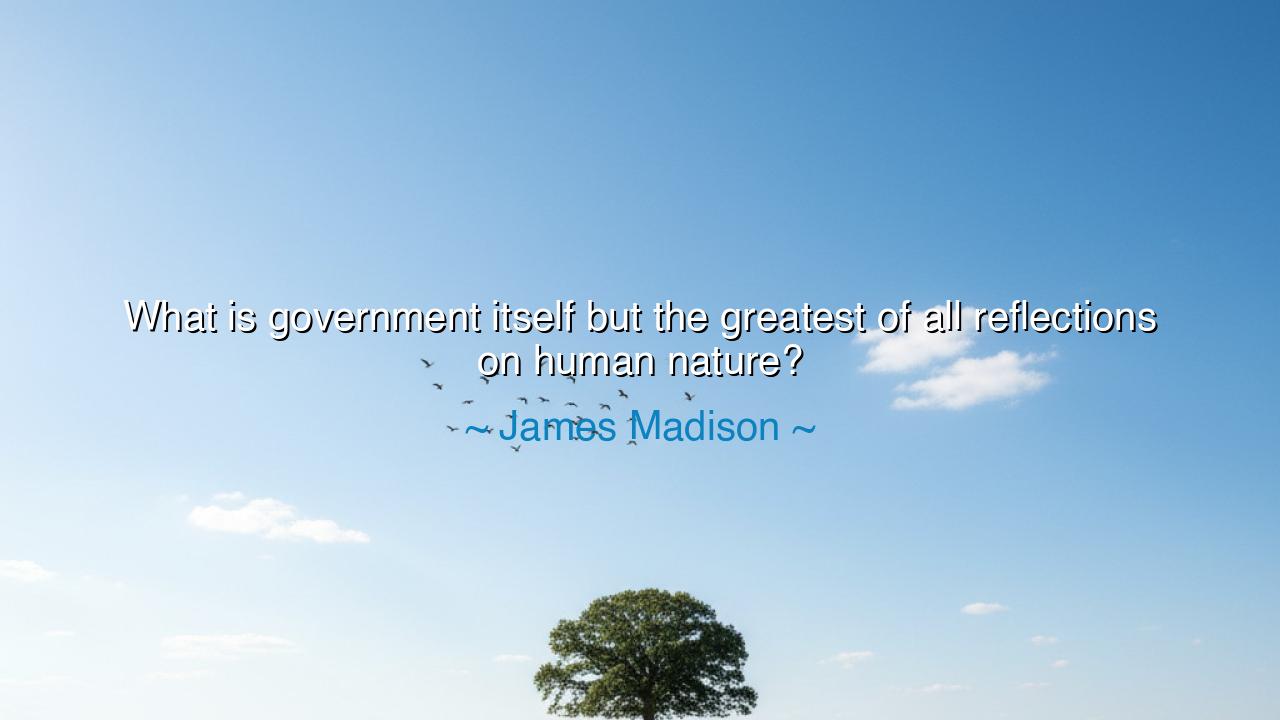
What is government itself but the greatest of all reflections on






"What is government itself but the greatest of all reflections on human nature?" – James Madison
In this profound and timeless statement, James Madison, the “Father of the Constitution,” pierces through the veil of politics to reveal the moral core of governance itself. His question is not rhetorical—it is philosophical, almost sacred. When Madison declares that government is a reflection of human nature, he is reminding us that no political structure can ever rise above the hearts and habits of the people it serves. Every law, every institution, every constitution mirrors the virtues and vices of mankind. If humanity is noble, government will be just; if humanity is corrupt, government will decay. Thus, Madison’s words are not merely an observation—they are a warning and a summons to self-examination.
The origin of this quote lies within Federalist Paper No. 51, written in 1788, as Madison and his peers struggled to forge a republic from the ashes of revolution. The young nation stood at a precipice: too much power, and liberty would vanish into tyranny; too little, and chaos would consume order. Madison, steeped in both philosophy and experience, understood that designing a government required more than clever structure—it required an understanding of the human soul. “If men were angels,” he wrote, “no government would be necessary.” But since they were not, government had to be built in such a way that ambition could be made to counteract ambition, and power could check power. He saw in this delicate balance the essence of humanity itself—our capacity for greatness intertwined with our tendency toward corruption.
His words capture the eternal paradox of civilization: that man must be governed because he cannot govern himself perfectly, yet every government he builds is flawed because it is built by men. This is the tragic, magnificent truth of human history. Kingdoms rise and fall, republics flourish and crumble, because each reflects the nature of the people within it. Madison’s insight transcends time and nation; it is as true in ancient Rome as in modern America, as relevant to emperors as to common citizens. Government, in all its complexity, is nothing more than a mirror held up to humanity’s collective soul.
Consider, for example, the rise and fall of the Roman Republic. In its early days, Rome was a model of civic virtue and disciplined self-rule. Its leaders served the people, not themselves; its citizens prized duty over pleasure. But as wealth and conquest swelled its borders, human nature’s darker impulses—greed, pride, and ambition—rose unchecked. Senators grew corrupt, generals sought power, and the people traded liberty for bread and spectacle. The Republic did not die because its constitution failed—it died because the moral fiber of its citizens did. Thus, Madison’s truth was lived out long before his time: the fall of a nation begins not in its institutions, but in the hearts of its people.
Yet Madison’s reflection is not only somber—it is deeply hopeful. If government mirrors human nature, then improvement is possible, for the mirror changes when the soul changes. He believed in the potential for reason, virtue, and education to refine mankind’s character. The Constitution he helped craft was not a declaration of perfection, but a framework for self-correction—a living system that assumes human imperfection yet strives toward justice. In this, Madison revealed his faith not in rulers, but in the people themselves: that through moral discipline and civic engagement, they could elevate both their government and their destiny.
His wisdom extends far beyond the political realm. Every family, every business, every community is a reflection of the human beings who compose it. When selfishness dominates, disorder follows; when integrity reigns, harmony is restored. Thus, Madison’s insight is as much personal as it is political. Each of us contributes to the moral climate of the age. Our choices ripple outward, shaping not only our own lives but the spirit of our institutions. A nation is not sustained by its laws alone, but by the character of its citizens.
The lesson, therefore, is this: to reform government, one must first reform the self. Every time a person acts with honesty, compassion, or courage, he polishes the mirror of the world just a little brighter. Every act of greed or apathy, likewise, tarnishes it. The truest patriot, then, is not merely one who waves the flag, but one who embodies the virtues that make liberty possible. A just government begins with a just heart.
And so, the practical actions are clear: cultivate integrity, not just in public speech but in private life. Respect the law, yet hold it accountable to conscience. Participate in your community not as a critic alone, but as a builder of goodness. Teach your children that freedom without virtue is fragility, and that the strength of a nation lies in the moral courage of its people. For as James Madison reminds us, government is the reflection of who we are—and if we wish to behold justice in its face, we must first light that justice within our own souls.






AAdministratorAdministrator
Welcome, honored guests. Please leave a comment, we will respond soon